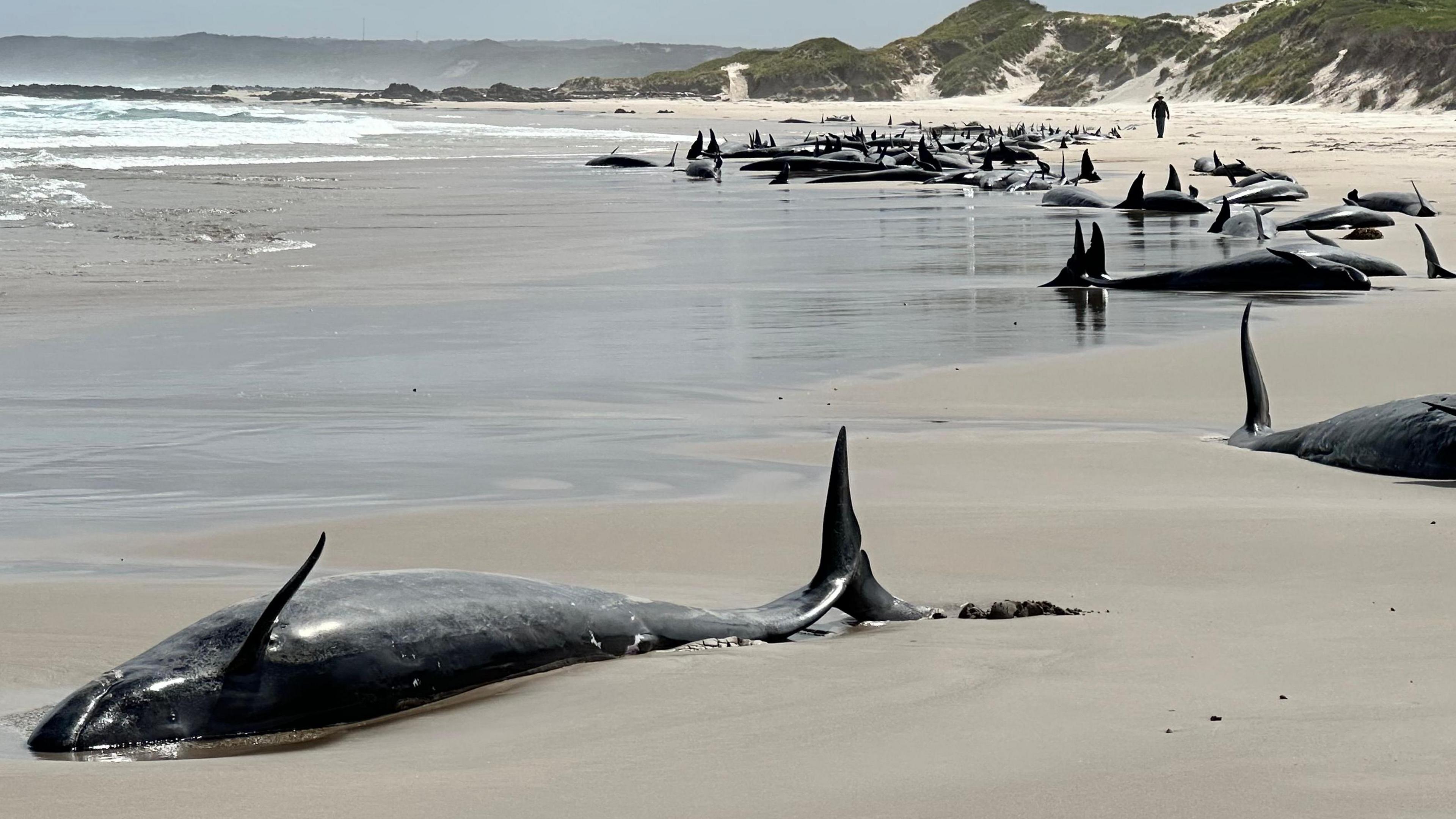Scores of whales to be euthanised after mass stranding in Australia

The false killer whales have beached in the north-west corner of Tasmania
- Published
Australian authorities are euthanising about 90 false killer whales which survived a mass stranding on a remote beach in Tasmania.
A team of experts at the site said complex conditions have made it impossible to save them.
They are part of a pod of 157 whales that had beached near Arthur River, in the island's north west. The rest had died shortly after the stranding.
Tasmania has seen a series of mass whale strandings in recent years - including the country's worst-ever in 2020 - but false killer whales haven't mass stranded there in over 50 years.
False killer whales are technically one of world's largest dolphin species, like their orca namesakes. They can grow up to 6m (19ft) and weigh 1.5 tonnes.
Authorities on Wednesday said the pod had been stranded at the site for 24 to 48 hours, and the surviving animals were already under extreme stress.
Local resident Jocelyn Flint told the Australian Broadcasting Corporation she had travelled to the site on Wednesday morning after her son noticed the pod while out shark fishing overnight.
"There are babies... There's just families of them. Their eyes are open, they're looking at me, like 'help'."
"It's just absolutely horrific."
The site - about 300km (186 miles) from the city of Launceston - is extremely difficult to access and transport any rescue equipment to, marine biologist Kris Carlyon told media.
"This is possibly the trickiest location I've seen in 16 years of doing this role in Tasmania," he said.
"We're talking a very rough, steep, single lane road into the site. We can get four-wheel drives in there, but not a lot else."
Rough conditions meant returning the animals to the sea at the location they stranded was impossible, so an expert team tried to relocate two and refloat them, but were unsuccessful.
"The animals just can't get past the break to get out. They just keep turning around and coming back towards the beach," said Shelley Graham, from Tasmania's Parks and Wildlife Service.
With conditions for the next two days forecast to be similar, expert wildlife veterinarians made the "tough" and "confronting" decision to euthanise the remaining whales.
"The longer these animals are out stranded, the longer they are suffering. All alternative options have been unsuccessful, euthanasia is always a last resort," Dr Carlyon said.
That grim task - which involves shooting the animals - is expected to begin on Wednesday but continue on Thursday.
Authorities are still working out how to dispose of the carcasses. The site has important cultural heritage for Aboriginal people so a department spokesperson earlier suggested "it may be a case of... letting nature run its course".
Authorities have asked members of the public to avoid the site, with bushfires burning nearby and limited road access.
More than 80% of Australian whale strandings take place in Tasmania - often on its west coast.
Around 470 pilot whales were stranded further south at Macquarie Harbour in 2020 and about 350 of them died despite rescue efforts. Another 200 become stranded in the same harbour in 2022.
Whales are highly social mammals and are well known for stranding in groups because they travel in large, close-knit communities which rely on constant communication.
There are a range of theories for why beachings occur. Some experts say the animals can become disorientated after following fish they hunt to the shore.
Others believe that one individual can mistakenly lead whole groups to shore.

Sign up for our Future Earth newsletter to get exclusive insight on the latest climate and environment news from the BBC's Climate Editor Justin Rowlatt, delivered to your inbox every week. Outside the UK? Sign up to our international newsletter here.